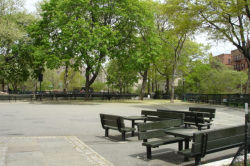Bennett Park
The Daily Plant : Thursday, February 26, 2004
STEPPING BACK IN TIME: WHAT WAS IN THE DAILY PLANT IN 1996?
The following article appeared in the Daily Plant on February 26, 1996.
HARLEM PLAYGROUND HONORS FORCE BEHIND KING HOLIDAY
The 1.2-acre Howard Bennett Playground is located on 135th Street between Fifth Avenue and Malcolm X Boulevard in Harlem, adjacent to Harlem Hospital and P.S. 197. The land was acquired by the City in 1954 and opened as a Jointly Operated Playground in 1958.
On March 22, 1982, thanks to Local Law #14, it was named for Howard Bennett, the founder and force behind the National Citizens Committee for Dr. Martin Luther King, Jr. Holiday. From the time of King’s assassination in April of 1968 until his own death in October of 1981, Bennett campaigned to make the birthday of the civil rights leader a national holiday.
Bennett was born in 1911 in Greenwich Village, one of 16 children. After serving in the Pacific Theater during World War II, he became an active leader of the 369th Veterans Association, a Harlem-based organization of African-American veterans. He served as Labor Chairman of the New York branch of the NAACP and was a consultant and confidante of the labor leader A. Philip Randolph.
The idea for the holiday was hatched while Bennett and several friends were returning from King’s funeral in Atlanta. After renting a storefront in Harlem (formerly a rummage sale outlet), which he called "Dr. Martin Luther King, Jr. Holiday," Bennett, with no other money than his small veteran’s pension at his disposal, enlisted the help of a few dedicated grassroots activists across the United States and began gathering signatures to show support for the holiday.
To make the day of King’s birth, January 15, a legal holiday, both the House of Representatives and the Senate needed to pass legislation declaring the creation of a holiday. The bill then needed to pass to the desk of the President, who would either sign the holiday into law or veto the bill.
Bennett and his colleagues met with tremendous success as they collected signatures and won more and more support, from individuals and from groups, for their cause. By April of 1969, Bennett had collected 2 million signatures. Over the next year, the number tripled, testimony to the outpouring of support shown Bennett and his team and the degree to which people around the country believed in the creation of a holiday to one of the most pivotal figures in twentieth-century history.
On April 4, 1970, Bennett, his colleague William Byrd, Executive Director of the 131st Street Block Association, along with members of the 131st Street Block Association and Hal Jackson, New York WBLS Disc Jockey, proudly presented 6 ½ million signatures to Richard Conyers, Detroit Congressman, and Shirley Chisolm, Brooklyn Congresswoman.
Undertaking the next step, these two elected officials introduced the King Holiday Bill into Congress. The process of examining the bill was far from speedy; while Bennett had collected and organized the signatures over a period of two years, it took Congress 13 years to get to the bill. On August 2, 1983, the House of Representatives passed the bill (338-90) and over two months later, on October 20, 1983, the Senate passed it (78-22). Finally, on November 2, 1983, President Ronald Reagan signed Public Law HR3706, officially making January 15th a national holiday in honor of Martin Luther King, Jr. Three years later, in 1986, the Martin Luther King, Jr. Day was observed on the third Monday in January, as it is today.
Bennett who died in 1981, did not live to know that his efforts had been rewarded with the declaration of the national holiday. While the bill was in Congress, however, he worked tirelessly on behalf of the civil rights movement, and in 1977 was awarded an honorary Doctor of Humanities Degree from the Southeastern University of Greenville, South Carolina, for his contributions to civil rights. Bennett’s last public act, a fitting conclusion to a life dedicated to the amelioration of the lives of men, women and children around the country, was his participation in the Solidarity March-on-Washington for Jobs on September 19, 1981.
QUOTATION FOR THE DAY
"You may break, you may shatter the vase, if you will,
But the scent of the roses will hang around it still."
Thomas Moore
(1779-1852)
Check out your park's Vital Signs
Clean & Safe
Green & Resilient
Empowered & Engaged Users
Share your feedback or learn more about how this park is part of a
Vital Park System



